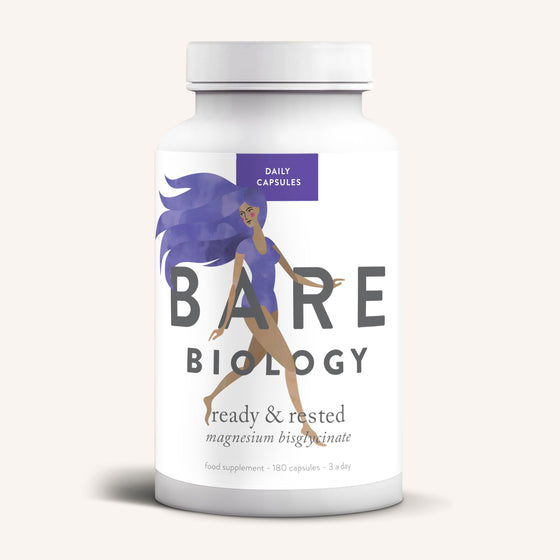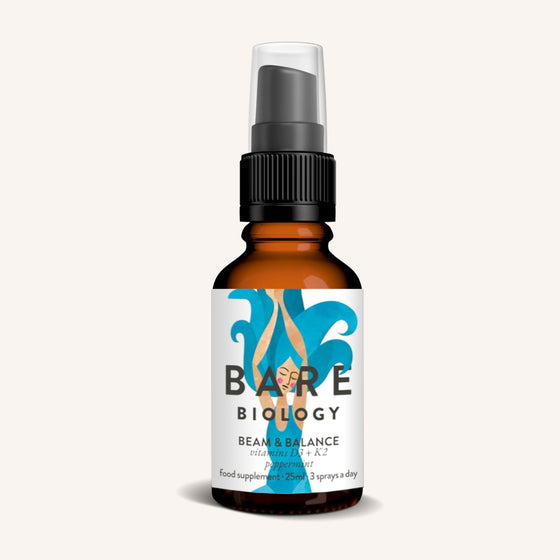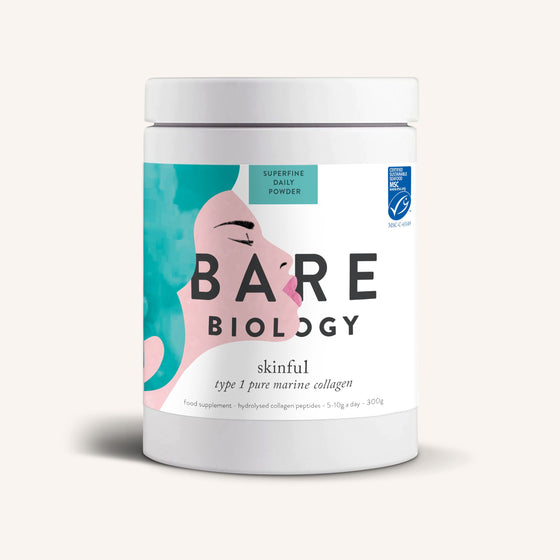Read time: 8 minutes
If you’ve been with us from the beginning you’ll know that Bare Biology was born out of my own mental health struggles. Our new product Pure DHA Omega-3 Supplements is specifically designed to make it easier for people suffering to find the product they need. This month, I interviewed journalist and mental health advocate Bryony Gordon as part of Liberty’s January Reset campaign. As expected, Bryony was a bundle of positive energy, knowledge, and smiles. We had a good natter about our mental health and the benefits of physical exercise for a happier mind. If you didn’t manage to make the event, here are some of the highlights…
Melanie: Hi I’m Melanie, the founder of Bare Biology, and I’m here today with Bryony Gordon, Bryony would you like to tell us a bit about you?
Bryony: So, I’m a journalist, writer, and accidental mental health campaigner. Around 4 years ago I wrote about my experience with OCD for The Telegraph and I was having a particularly nasty episode of it. I have something called 'Pure O' and the way I describe it is your brain literally refusing to acknowledge what your eyes can see, like your hands being clean, or that the oven is off. We all have hundreds of thoughts a day but I knew that my intrusive thoughts were OCD. I had never met anyone else who had it.
M: Bryony and I both have the same type of OCD and I’d never actually met anyone with the same type before either.
B: OCD isn’t what you think. It’s not keeping stuff clean unfortunately, as my husband says! It’s about intrusive thoughts and it can be really disturbing, especially when you’ve got children.
M: Yes, it is. I’ve had OCD since I was 9 and then I got very bad postnatal depression after my second child.
B: A few years ago I was having a really bad episode with depression. I didn’t really want to get out of the house. I was scared and I couldn’t think of anywhere I could go to tell someone about the stuff in my head, so I started running. One day I was on Clapham Common and I had a look around and saw footballers and people doing their exercise classes and thought, we know that 1 in 4 people suffer with their mental health and we also know that exercise is also one of the things that is proven to help. I wanted to knit these two things together.
I ran home, and said to my husband, “I’m going to set up a meet up at the park, I’ll put the time and date on Twitter and see if people turn up.” He said, “what if a load of nutters turn up?” and I said, “well, that’s the point!”
That was February 2016. Mental Health Mates is still going strong today.
M: I think Mental Health Mates has played a massive part in people being able to talk openly about their mental health.
B: It’s really weird because it was completely accidental and unexpected. It was all born out of my own desperation to meet other people like me. What I love about Mental Health Mates is that it’s taking a profoundly negative experience and spinning it on its head and turning it into a positive. That’s the most empowering thing you can do.
M: Absolutely. My therapist said to me once, “you’re not your thoughts”. It’s the sort of thing a therapist would say and at the time you think, “yeah, yeah”, but it’s true. A lot of what I have going on with my mental health is self-loathing so I think turning those thoughts into something positive is the best thing to do.

B: The other thing about self-loathing is you don’t have to have a mental illness to beat yourself up. I’m writing a mental health book for teenage girls at the moment and those feelings of awkwardness and not fitting in and wanting to do better are all normal. Self-loathing is the norm for most of us and society encourages it. If we feel less than - we are more likely to buy that lipstick or try and fit into that pair of jeans. If someone loves themselves, it’s seen as arrogance. But I think it’s great that we’re exploring ways to look after ourselves and self-care. You know, it sounds cheesy and I’m quite cynical but I think it’s very important.
M: When I listen to some of the things I say to myself sometimes I think, God imagine if I said that to my daughter.
B: There are things we say to ourselves that we wouldn’t even say to our worst enemies. I’m also really bad at taking compliments. Someone will say to me, “I love your shirt” and I’ll say “oh it cost me 50p from Primark but it hides my bingo wings well!” And what we should do is just simply say “thank you” and put it in our pocket instead of stamping on it. You become a much kinder person to others when you’re being nicer to yourself.
M: It’s so true, I’m not great at that. Two and a half years ago my mum died of cancer and I nursed her through it and then after she passed away, I just carried on because I had a business and 3 kids to look after. I didn’t take time to look after myself. A year later, I visited my GP because I felt like I was going to have a heart attack and was convinced I had a heart condition. He told me I had anxiety and depression and asked me to try anti-depressants. I was reluctant to because I felt like I was failing, and I had this thing that if I took them I was a loser. I ended up listening to his advice and took them, I did feel better. I remember sitting in the car one day and I felt weird and after a couple of minutes, I realised I was feeling happy. I hadn’t felt like that in so long that I’d forgotten what it felt like.
Fast forward a year later and I wanted to try and come off them and replace them with running. I met former Olympian, Leon Taylor who had also suffered with depression. He’s spoken lots about mental health and how physical exercise can help and he basically helped me get back into running. I'm training for the Brighton half marathon too.

B: The thing about running or any exercise in general is that you will never regret going. People talk a lot about the physical benefits but whenever I’ve tried to do it for that reason, I couldn’t get into it because I was doing it for the loss, not for the gain. The moment I started doing it for mental clarity and endorphins I found it really fun. Kids exercise without even realising it, they just jump around and have fun.
M: This is a bit of a hard question, but what do you think is the answer to better mental health?
B: We’ve got to the point where we’ve encouraged people to talk but there needs to be people for them to talk to. Mental Health Mates and peer support groups can’t do the work alone so now I think it’s really important that people in a position of power listen to what’s being said and put stuff in place. Some of the stories you hear about trying to get mental health care are horrific. We also need to look at mental health in children so we address things earlier and give them coping mechanisms.
Shop Mindful Pure DHA Omega-3 Supplements.






